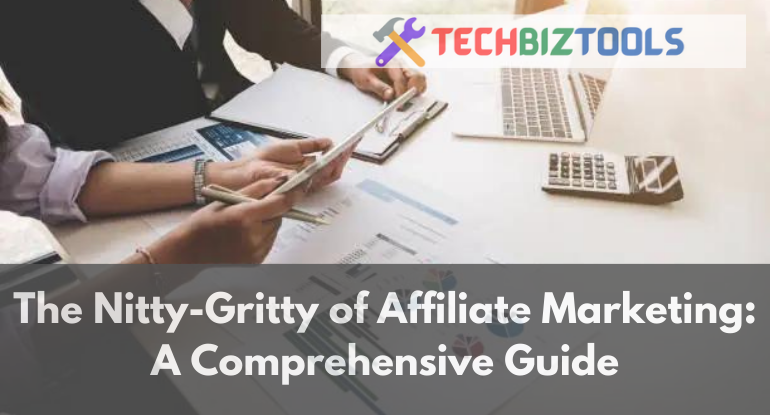
The Nitty-Gritty of Affiliate Marketing: A Comprehensive Guide
Affiliate marketing is a powerful strategy in the world of online business, allowing individuals and companies to generate revenue by promoting products or services from other businesses.
It's a win-win situation: companies gain increased sales, and affiliates earn commissions for their efforts.
In this comprehensive guide, we'll delve into the nitty-gritty of affiliate marketing, exploring its fundamental concepts, strategies, tips, and best practices.
Understanding Affiliate Marketing
What is Affiliate Marketing?
Affiliate marketing is a dynamic and symbiotic online marketing strategy where individuals, known as affiliates or publishers, promote products or services on behalf of merchants or advertisers.
The heart of this arrangement lies in the commission-based structure, where affiliates earn a portion of the revenue from each sale, lead, or click generated through their marketing efforts.
In simple terms, affiliates act as intermediaries connecting potential customers to products or services they might be interested in. The process starts with affiliates promoting a unique tracking link, often provided by the merchant.
When a potential customer clicks on this link and engages in a desired action (like making a purchase), the affiliate is credited with a commission.
Key Players in Affiliate Marketing
#1. Merchants (Advertisers): These are businesses or individuals offering products or services seeking affiliates to promote them.
Merchants are the driving force behind affiliate programs and are responsible for providing promotional materials, tracking tools, and defining commission structures.
#2. Affiliates (Publishers): Affiliates are individuals or entities who join affiliate programs to promote the products or services offered by merchants.
They utilize various marketing channels, as mentioned earlier, to reach potential customers and encourage them to engage with the merchant's offerings.
#3. Customers: Customers, also known as end-users, are the individuals who purchase the products or services through the affiliate's promotional efforts.
Their actions, such as making a purchase or signing up, ultimately drive the commission earned by the affiliate.
#4. Affiliate Networks: Affiliate networks serve as intermediaries facilitating connections between affiliates and merchants.
These networks provide a centralized platform for affiliates to choose from a variety of affiliate programs, manage their promotions, and track their performance.
They often offer payment processing and reporting services, making the affiliate marketing process more efficient.
Understanding the roles of these key players is essential in comprehending how affiliate marketing operates and how each entity contributes to the success of the affiliate marketing ecosystem.
The intricate relationships among these players are fundamental to establishing effective and mutually beneficial partnerships within the affiliate marketing industry.
How Affiliate Marketing Works

Affiliate Links
Affiliate links are the cornerstone of affiliate marketing. These are unique URLs that affiliates receive from the merchant to promote a specific product or service.
The links are embedded with tracking codes, allowing merchants to identify and credit the respective affiliate for any resulting transactions.
When a potential customer clicks on an affiliate link and makes a purchase, signs up, or engages with the merchant's offering, the affiliate is attributed a commission for driving that action.
These links serve a dual purpose: they lead potential customers to the merchant's website while also tracking the affiliate's marketing efforts. The tracking ensures that affiliates receive the compensation they deserve for their promotional activities.
Commission Models:
#1. Pay-Per-Sale (PPS): Pay-Per-Sale is one of the most common commission models in affiliate marketing. Affiliates earn a commission for each sale made through their referral link.
The commission is usually a percentage of the sale value and is predetermined by the merchant. This incentivizes affiliates to focus on driving actual sales, making it a performance-based compensation structure.
#2. Pay-Per-Lead (PPL): In the Pay-Per-Lead model, affiliates earn a commission for generating leads for the merchant. A lead could be a sign-up, a form submission, or any desired action specified by the merchant.
Affiliates are compensated for successfully directing potential customers who express interest in the merchant's offerings.
#3. Pay-Per-Click (PPC): Pay-Per-Click is a commission model where affiliates earn a commission for each click on their referral link, irrespective of whether it leads to a sale or not.
While less common than PPS and PPL, it provides compensation for driving traffic to the merchant's site. It's important to note that the success of this model relies on the ability to attract significant traffic and engage users effectively.
Understanding these commission models is vital for affiliates to choose the most appropriate structure based on their audience, marketing strategies, and the nature of the merchant's product or service.
Each model has its own merits and aligns with different affiliate marketing objectives, allowing for flexibility and customization in the affiliate's approach.
Strategies for Success in Affiliate Marketing
Affiliate marketing can be a lucrative venture if approached strategically and with a focus on maximizing your efforts. Here are key strategies to achieve success in the world of affiliate marketing:
#1. Choose the Right Niche
Selecting the appropriate niche is a fundamental step in creating a successful affiliate marketing strategy. It's crucial to choose a niche that aligns with your interests, expertise, and target audience.
Understanding your audience's needs and preferences helps in identifying products or services within the niche that have a high demand in the market. A well-suited niche will enhance your credibility and make it easier to connect with potential customers.
#2. Quality Content Creation
Creating high-quality and valuable content is at the heart of any successful affiliate marketing strategy. Regardless of the format (blog posts, videos, social media updates), the content you produce should resonate with your audience.
Focus on providing informative, engaging, and relevant content that educates, entertains, or solves a problem for your target audience. Quality content builds trust and encourages users to click on your affiliate links.
#3. SEO Optimization
Leveraging effective Search Engine Optimization (SEO) strategies is paramount for increasing the visibility of your content in search engine results.
Conduct keyword research to identify relevant and high-ranking keywords in your niche. Incorporate these keywords naturally into your content, meta descriptions, headings, and URLs.
Additionally, obtaining backlinks from reputable websites and optimizing the site structure can significantly boost your organic traffic and improve your affiliate content's performance.
#4. Email Marketing

Building a subscriber list and utilizing email marketing campaigns is a powerful strategy to promote affiliate products. Focus on growing a list of engaged and interested subscribers.
Send personalized and targeted emails promoting affiliate products, highlighting their benefits and features. A well-crafted email can encourage subscribers to take action, resulting in increased conversions and commissions.
#5. Social Media Promotion
Leverage the immense reach of social media platforms to expand your audience and promote affiliate products effectively. Share engaging posts, videos, or images related to the products you're promoting.
Run targeted advertisements to reach specific demographics likely to be interested in your affiliate offerings.
Actively engage with your audience by responding to comments, conducting Q&A sessions, and fostering a sense of community around your content. Social media can drive significant traffic to your affiliate links when utilized strategically.
Best Practices
Affiliate marketing, like any business endeavor, benefits from adhering to best practices. These guidelines will help you maintain integrity, optimize your revenue, and build a loyal audience. Here are the top practices to follow:
#1. Full Disclosure
Transparency is key in affiliate marketing. Always disclose your use of affiliate links to your audience. Clearly state when a link is an affiliate link or if you may earn a commission if they make a purchase through that link.
This fosters trust and helps maintain a strong and honest relationship with your audience. It's not just an ethical requirement but a legal one as well in many jurisdictions.
#2. Research and Select Quality Programs
Not all affiliate programs are created equal. Take the time to thoroughly research and vet affiliate programs before joining them. Look for programs that offer high-quality products or services that align with your audience's interests.
Ensure the commissions offered are fair and competitive. A reliable tracking system is also crucial for accurately attributing your referrals and commissions. Choose programs that have a good reputation and a track record of timely payments.
#3. Monitor Performance
Regularly monitoring the performance of your affiliate marketing campaigns is crucial for success. Track important metrics such as click-through rates, conversion rates, earnings per click, and overall revenue generated.
Analyze which strategies are producing the best results and which ones may need adjustments. Optimize your approach based on these insights to maximize your earnings and improve your overall performance.
Conclusion
Affiliate marketing is a dynamic and rewarding venture for both affiliates and merchants. Understanding its fundamental concepts and implementing effective strategies is key to success in this space.
By choosing the right niche, creating valuable content, optimizing for SEO, and employing ethical practices, you can build a successful affiliate marketing business that generates sustainable income over time. Happy affiliate marketing.